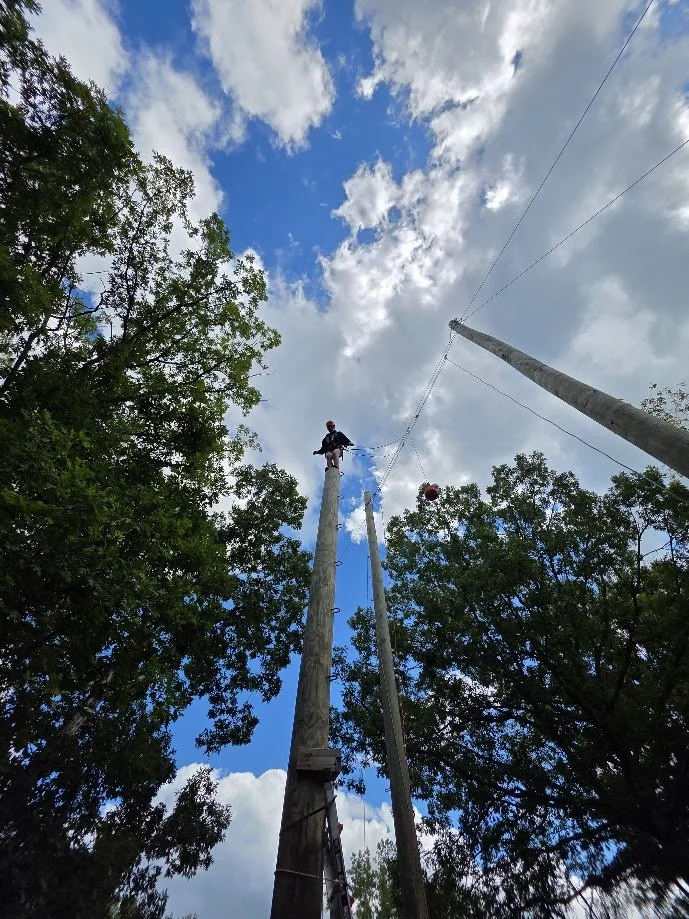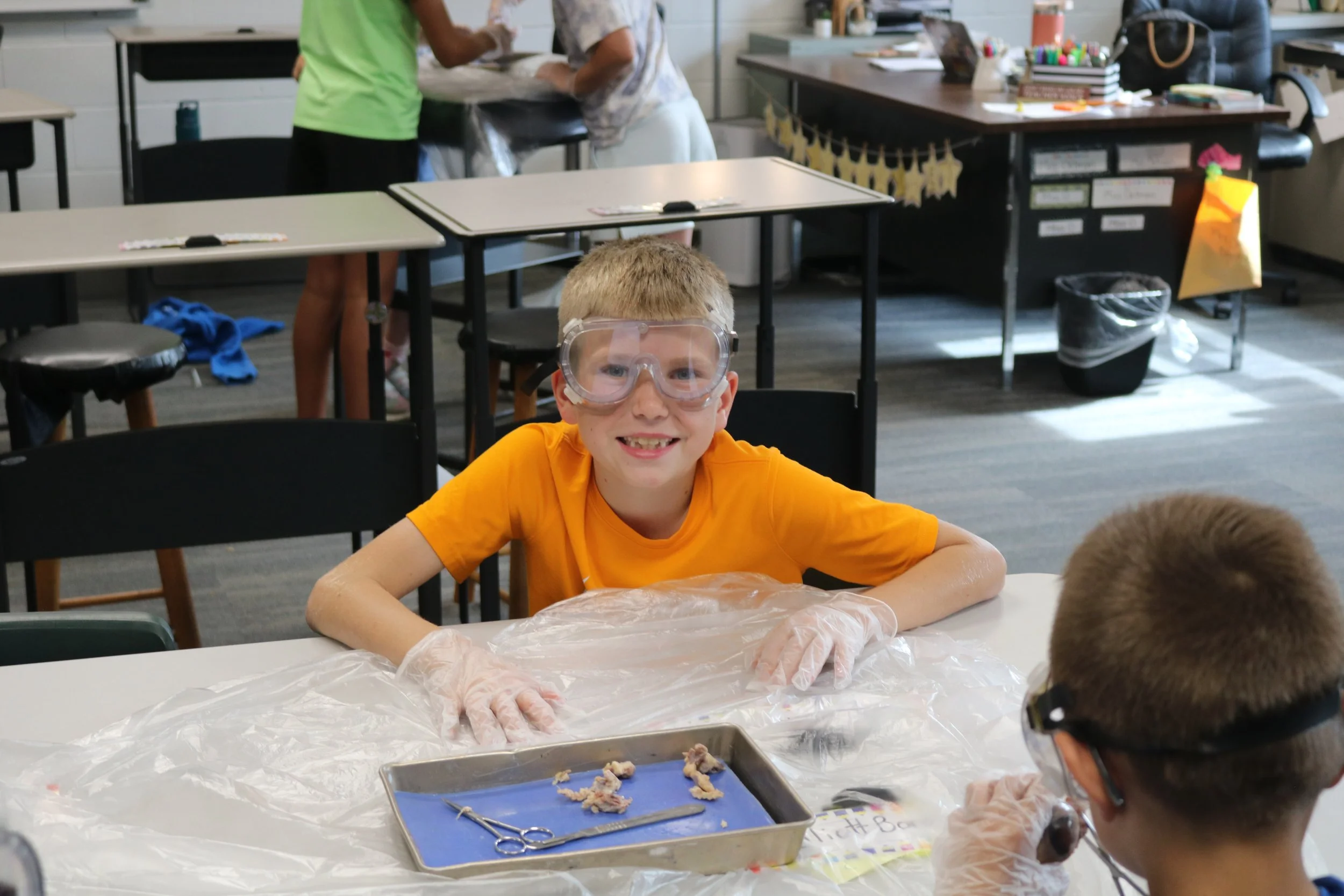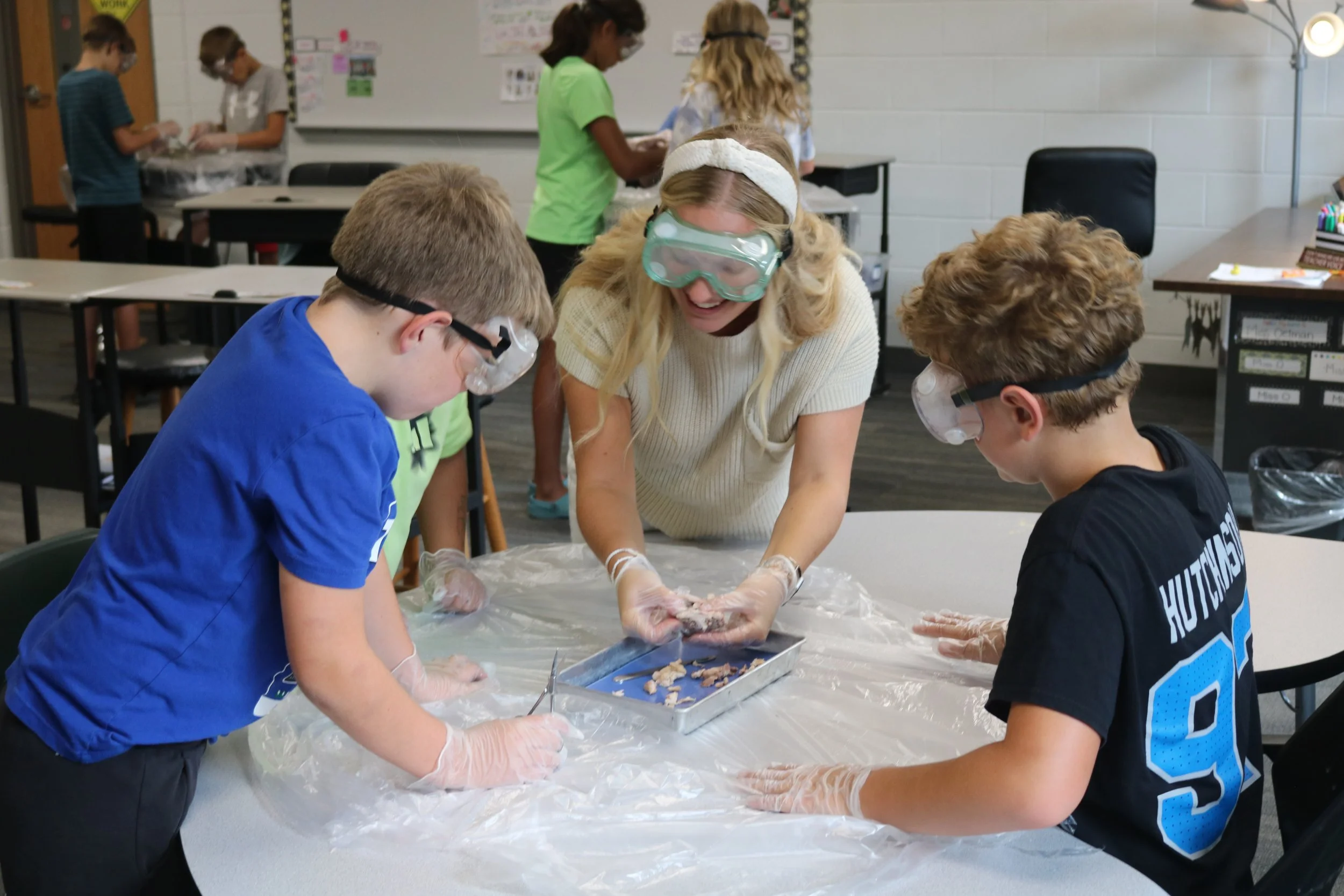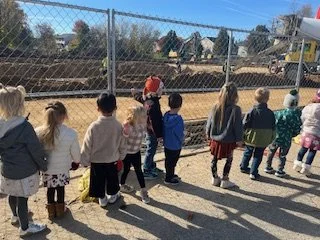The following article contains a fascinating summary of a variety of educational topics. While only one outside resource, Edutopia shares about some prevalent topics. This website is not a guiding tool for BCCS, but it was great to see reinforcement of our decisions on things such as cell phone policy, learning improvement goals, time outside, and the vital role of a Christian teacher!
A Flourishing Community: Puzzles, Water, and Beauty!
Pieces of the Puzzle
During middle school small groups and elementary family groups, students spend time together deepening their faith and building community. Last week, all first through eight grade learners gathered to create puzzle pieces, with each piece listing both talents and challenges. It was powerful to observe learners hear from peers about their gifts, and also personally reflect on their own growth opportunities. The finished puzzle pieces are displayed in our hallway as a symbol of a Christ-centered community.
“Now you are the body of Christ, and each one of you is a part of it.” 1 Corinthians 12:27
Water!
As our place-based preschool class went through their water study, students engaged in a wide range of fun and meaningful learning activities, from playing in water to building a rain barrel. They also explored why clean water is so important.
To extend learning and share God’s love, teachers challenged students to earn coins for Filters of Hope by completing acts of service outside their normal routines. Children got busy emptying the dishwasher, bringing in wood for a fire, organizing shoes and coats, washing windows, helping grandparents, and more! At school, students eagerly shared how they helped at home and used their earned coins to purchase four water filters for people in need! Our preschoolers reflected that helping others made them feel good.
This experience is a great example of how teachers design learning that is engaging, meaningful, and connected to real needs so that students see AND live God’s story. Great work, preschoolers!
Beauty Creators
Congratulations to our talented 1st–8th grade students and to our creative art teachers, Mrs. Bergsma and Mrs. Bruinsma! Their mixed-media artwork, Love Your Neighbor, received the highest number of votes from attendees at the Christian art exhibit, Colors of Praise. The students voted to use their cash prize to purchase food items for our Buist giving project. This piece will be hung in our East Campus conference room!
A Flourishing Community
Celebration of Learning
Our fifth-grade students recently completed a FLEx (Formational Learning Experience) in which they wrote “stories of hope” and shared that work with individuals undergoing cancer treatment. To conclude the project, they welcomed more than 70 guests to a special Celebration of Learning. Attendees heard about the students’ learning outcomes, listened to the students’ stories, and joined together in prayer over the books. It was a powerful time of reflection on God’s perspective and a joyful celebration of how He will use these stories to bring hope and encouragement to others!
Thankful Writing
Our first graders have been learning how to write prayers of thankfulness to God and how to use their words to encourage others. To put this into practice, they visited Railside, where they sang, prayed, and helped build community with residents. Students shared their Bible memory work as well as the prayers they had written. Later, they took time to reflect on the experience:
“I felt warm and good….I was surprised by the sucker.” (one resident shared a treat)
“God felt really happy. We were saying His words.”
“We could get to know more people.”
“One person said she would hang my picture in her room!”
We are Learners
Our students are learners, and so is our staff! Last month, teachers focused on strengthening practices that improve the student experience. They explored new ways to use assessments to better support individual learners, and they designed FLEx (Formational Learning Experiences) that help students grow as disciples. They even braved the wild weather to walk the trails and visit three outdoor learning spaces. We are grateful for dedicated professionals who love God and love helping students thrive!
A Flourishing Community
Snapshots of life at BCCS and why it is a great place to learn!
Storyline in Music
Miss Davis shares her love of music with nearly all our students, teaching both Music and Choir. Her storyline “Why Worship?” invites students to reflect more deeply on their participation and motivation. Here are a few thoughtful middle school reflections on "Why Worship?":
-I worship because God heals and even when I’m in my lowest of lows, God takes me to the highest of highs.
-I worship because I have a God who deserves everything we can give Him
-I worship because it’s my time with God and a way to get away from the world.
-I worship because it's the least I can do to thank God for saving me.
-I worship because God held my hand through my hardships and troubles
Social Studies Past and Present
Early this trimester, BCCS parent, veteran, and author Ron Jansen visited our eighth-grade classrooms to share about his time serving in the United States Marine Corps. Mr. Jansen not only offered powerful stories from his service but also reminded our students of the importance of supporting veterans within our community. While daily activities such as conducting research, reviewing primary sources, and creating fictional soldiers engaged learners, his message connected to our students’ study of the Civil War and their 60-Year Learning Targets of recognising that all people are made in God’s image and demonstrating courage and grace in serving others.
We’re so grateful to Mr. Jansen for his service and for inspiring our students to learn, reflect, and live out their faith in meaningful ways!
Math Counts
We are grateful to New Lift Thrift Store for many reasons! Early this month, it was because our students were able to visit as an extension of their math learning. Sixth-grade students are using their understanding of percentages and proportions to find the savings realized by shopping at New Life Thrift Store. They compared the prices of used clothes to those of new ones. They talked about the importance of reusing. And they also volunteered at the store as members of the community!
Invitation to The Story
At BCCS, we believe every child is part of God’s Big Story, a story of creation, brokenness, and redemption through Jesus. We want students to see how their learning helps them live out that story each day. One way we do this is through classroom Storylines that help connect all learning to who God is and who He’s calling them to be.
Third Grade: Rooted, Growing, Loving
Mrs. Konydyk's class kicked off their year with a nature walk, looking closely at the plants and trees around our school. As they explored, they noticed the roots, how they hold the plants up, give them strength, and help them grow. Back in the classroom, students reflected on how being “rooted in Christ” gives us that same kind of strength and stability. This Storyline, Rooted, Growing, Loving, will guide their year. As students learn math, read stories, and explore the world, they’ll also be asking: How is my learning rooted in the Word? How is this helping me grow in Jesus? How can I love others well because of what I’m learning?
5th/6th Grade Science: So Will I
The 5th and 6th graders began science with a worship song and a question: If creation worships God, how will I? Their storyline, So Will I, invites them to think deeply about how their faith informs their learning and living. Whether they’re studying ecosystems, energy, or weather, they’re also being encouraged to consider their response: How will I live out what I believe? Maybe it’s keeping a promise, caring for creation, or standing up for what’s right. In science class this year, lessons will continually connect back to this theme, weaving together academic learning with the essential behaviors that reflect life in God’s story.
Each classroom is a place where students are invited to discover how they fit into the greatest story ever written. We’re so excited for the year ahead and all the ways our students will grow, not just in knowledge, but in faith, character, and wonder.
Administrator Welcome
At Byron Center Christian School (BCCS), we are both missional and intentional in all that we do. Our teachers build relationships with every student and differentiate for every ability. Teachers are our school’s greatest resource, and they are committed to every child’s growth spiritually, academically, and socially.
As part of that commitment, we devote time each week to focus on student learning as a Professional Learning Community (PLC). They are ensuring that our school has a guaranteed and viable curriculum that is rooted in a Biblical worldview, excellent in meeting the needs of students, and ultimately prepares each one for a lifetime of service to God.
Our teachers are a team. They are not on their own island working in isolation, but instead are partnering together and utilizing each other’s strengths for the benefit of all children. They are collaborating, problem-solving, communicating, and designing learning experiences that will equip and prepare our students to live out their faith. Our teachers are modeling and refining the skills we want our children to have. That learning is transformational and essential for teaching at BCCS.
The calling of a teacher is not always easy, nor is being a student, but in our community, we can do great things and hard things. Grit is a key trait that will be needed of the next generation of Christ-followers. It is an essential component of being prepared. The largest graduating class of BCCS students has made their way to high school. We know they, along with all the classes that follow them, will display grit and be prepared for the challenges in life that lie ahead. With Jesus in their hearts and the foundation of the Christ-centered education they have received from our teaching team, they will make an eternal impact
Thriving in Preschool
Each fall, we welcome a new group of preschool students and parents. The first few weeks are filled with numerous new experiences for both learners and their families. The best part is that we as staff get to experience it with them, and we get a front row seat!
We wish you could see how Mrs. Vieu talks to a crying student in the hallway. We wish you could see Mrs. Visser dancing with her class. We wish you could see the excitement of Mrs. Cornea. We wish you could see our place-based students explore God’s creation. We wish you could see the joy of students and teachers as they develop classroom communities. Our entire preschool team works to intentionally design learning tailored to fit the needs of our three- and four-year-olds while at the same time helping them know they are safe, at home, and loved. Inside and outside these walls, the little things matter, and you can see it through the hearts and deep hopes of our teachers. We are looking forward to supporting the growth of each preschool child as they learn to love the Lord and love learning!
Through the eyes of our youngest learners, we are continually reminded of God’s faithfulness.
Registration Dates for Preschool, Junior Kindergarten, and Kindergarten
We are excited to share some important dates regarding registration and enrollment for the 2026-2027 school year!
Preschool priority registration will begin on Wednesday, December 10. Priority registration is for any family (current or new to BCCS) who plans to or already does send their children to elementary school at BCCS.
Preschool open registration will begin January 14. This is for any family who does not know where their children will go to elementary school, or those who only use our preschool program.
Junior kindergarten and kindergarten registration will also open on January 14. Even current BCCS families must register so we know which kindergarten class you prefer for your son or daughter.
Please save these dates as spaces are limited in preschool, junior kindergarten, and kindergarten classrooms. All registration links will be located at www.bccs.org/registration.
Following the registration window, email confirmations will be sent in February, and application instructions will be provided in March or April. If you have any questions regarding this process, email Andy Reidsma at reidsma@bccs.org or call 616.878.3347, or see an outline here.
If you want to learn more about BCCS, we highly recommend a personal campus tour so you can see classrooms, meet teachers, and ask all your questions. We want you to be able to find the place where God has called your family!
A Flourishing Community
Short stories a picture of what makes BCCS a great place to learn!
Math Counts
We are grateful to New Lift Thrift Store for many reasons! Early this month, it was because our students were able to visit as an extension of their math learning. Sixth-grade students are using their understanding of percentages and proportions to find the savings realized by shopping at New Life Thrift Store. They compared the prices of used clothes to those of new ones. They talked about the importance of reusing. And they also volunteered at the store as members of the community!
Preschool Walks
Learning can happen in many places! Recently, groups of preschool classes at BCCS have been taking to downtown Byron Center (via hike) to explore things in our community related to what they are learning. Units of study in preschool include buildings and signs, so learners enjoyed discovering those things around town. Highlights included the big cow, talking to business owners, the fire station doors, and the unique church building features. Learning comes alive in all different places at BCCS!
Using Big Words
First-grade teachers are helping students thrive academically and behaviorally by introducing advanced vocabulary like "effective communication." Last week, Mrs. Wilson taught this term by showing students what "effective communication" looks like in action, being kind and listening well. She used this term in math, during devotions, and all throughout the day. She highlighted moments when students demonstrated it, helping them see the words in action. This intentional work builds strong learning habits, deep thinking, and helps hearts flourish!
With Faith Update: The First Steps
We are thrilled to announce that construction is officially underway! Excavators have prepared the space, and concrete for the footings and foundation walls is being poured. What was once a vision for the West Campus is now beginning to take shape.
Thanks to the generosity and prayers of our community, we’ve now reached $7.3 million toward our $10 million goal. This milestone allows us to move forward with creating beautiful learning spaces for our preschool and kindergarten students. We’re especially grateful for the partnership of our many construction contractors and CarbonSix, whose services have helped make this solid start possible. Their partnership is a beautiful reflection of God’s provision through His people.
Each delivery of sand and concrete reminds us that we are building more than a school foundation, we are building a foundation of Christ in the lives of the students who will pass through these walls.
We are thankful for the faithful support of our community and for how they are helping declare His marvelous deeds to the next generation. We look forward to keeping you updated through the construction process.
“Since my youth, God, you have taught me, and to this day I declare your marvelous deeds.” —Psalm 71:17
